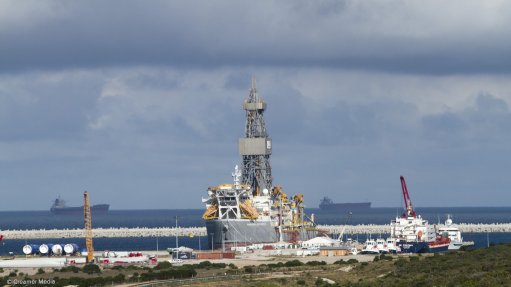
EMPLOYMENT OPPORTUNITY The construction and operation phases to accommodate a gas economy in South Africa will provide job opportunities and economic growth
Photo by: Duane Daws
The Coega Industrial Development Zone (IDZ) has initiated an environmental impact study for South Africa’s gas-to-power programme, and has strategically explored the IDZ’s full potential beyond its gas power plant’s current allocation of 1 000 MW.
“The foundation of South Africa’s readiness regarding the gas-to-power programme dates back to the early 2000s, with a prefeasibility study conducted in 2009. The work currently under way is supported by a decade of preliminary work,” says Coega Development Corporation (CDC) energy sector manager Sandisiwe Ncemane.
She explains that developing an industrial and commercial gas offtake market in South Africa will result in a relatively new industry for the economy, where natural gas can be used in several different downstream activities. New infrastructure bases will, thus, have to be created to accommodate the expected gas activity.
Ncemane emphasises that it is, therefore, imperative to develop the gas economy and facilitate industry conversion in anticipation of unlocking various opportunities presented across the gas value chain, upstream to downstream. Shale gas is just one example of the various indigenous gas prospects for South Africa.
Opportunities to develop an industrial and commercial gas offtake market in South Africa are also being presented to black-owned and women-owned entities, presenting opportunities for skills and enterprise development, supply chain development, as well as research and development. All these aspects will be integral to meeting the country’s socioeconomic imperatives, including inclusive growth.
Current Developments
The CDC is working closely with various entities towards transformational energy projects. Such projects involve natural gas, nuclear and renewable energy, as well as the oceans economy in the Eastern Cape.
The Dedisa peaking power plant, with a capacity of 342 MW, is operating within the Coega IDZ. The plant is convertible to a gas-driven power plant.
Mindful of South Africa’s diverse energy mix, the CDC has implemented a range of renewable-energy projects, says Ncemane. Most recently, the Clean Energy Africa-led Coega Solar Photovoltaic project was granted its generation licence by the National Energy Regulator of South Africa.
There is also advanced project development in off-grid renewables solutions with the implementation of solar rooftop solutions across various Coega top structures. An example is the construction of a 48 kW thin-film solar plant at the CDC Business Centre, evidence of the support of embedded generation solutions.
Skills Development
A vast range of skill sets is required to accommodate a gas economy. This means that, during the construction and operation phases of the gas projects, gas-to-power and industrial conversion in South Africa will result in vast employment opportunities.
“Workers will be equipped with a range of skills, designed to respond to industry requirements. In order to achieve this, skills planning, with a short- to medium-term outlook, must be devised, which will require collaboration across the gas industry and between academic institutions, technical and vocational education and training colleges, as well as government,” Ncemane points out.
New skill sets will be required to support the gas industry as the value chain deepens, with skills development making a notable contribution towards meeting South Africa’s socioeconomic imperatives, Ncemane concludes.